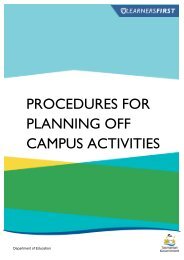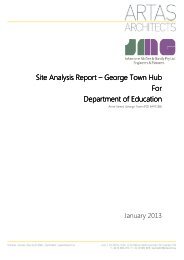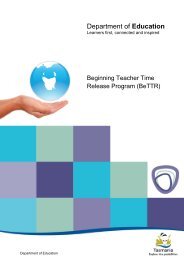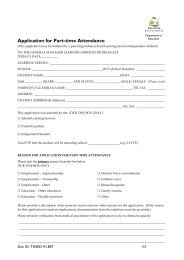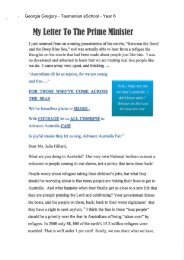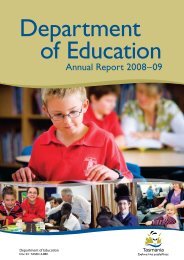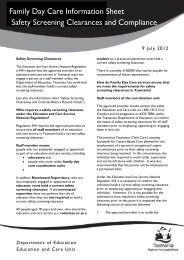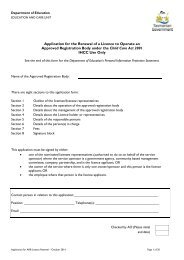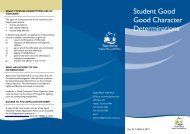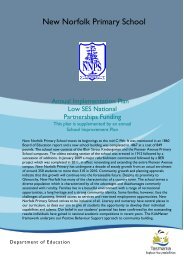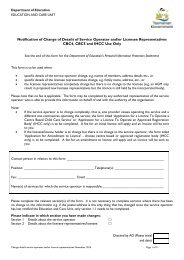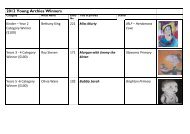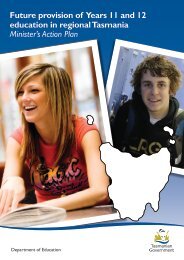Education
DoE Annual Report 2012-2013 - Department of Education
DoE Annual Report 2012-2013 - Department of Education
- No tags were found...
You also want an ePaper? Increase the reach of your titles
YUMPU automatically turns print PDFs into web optimized ePapers that Google loves.
2.2<br />
Basis of<br />
accounting<br />
The financial statements are a general purpose financial<br />
report and have been prepared in accordance with:<br />
• Australian Accounting Standards and interpretations<br />
issued by the Australian Accounting Standards Board<br />
• The Treasurer’s Instructions issued under the<br />
provisions of the Financial Management and Audit<br />
Act 1990.<br />
The financial statements were signed by the Secretary on<br />
14 August 2013.<br />
Compliance with the Australian Accounting Standards<br />
(AAS) may not result in compliance with International<br />
Financial Reporting Standards (IFRS) as the AAS include<br />
requirements and options available to not-for-profit<br />
organisations that are inconsistent with IFRS.<br />
The department is considered to be not-for-profit and has<br />
adopted some accounting policies under the AAS that do<br />
not comply with IFRS.<br />
The financial statements have been prepared on an<br />
accrual basis and, except where stated, are in accordance<br />
with the historical cost convention. The accounting policies<br />
are generally consistent with the previous year except for<br />
those changes outlined in note 2.6.<br />
The financial statements have been prepared as a going<br />
concern. The continued existence of the department<br />
in its present form, undertaking its current activities,<br />
is dependent on government policy and on continuing<br />
appropriations by parliament for the department’s<br />
administration and activities.<br />
2.3<br />
Reporting<br />
entity<br />
The financial statements include all the controlled activities<br />
of the department. The financial statements consolidate<br />
material transactions and balances of the department and<br />
entities included in its output groups. Material transactions<br />
and balances between the department and such entities<br />
have been eliminated.<br />
The department through a purchaser-provider model has<br />
predominately funded the operations of the Tasmanian<br />
Skills Institute. However, this organisation has operated as<br />
a statutory authority and has been a separate reporting<br />
entity with its transactions not consolidated into the<br />
Department of <strong>Education</strong>’s financial statements except for<br />
funds provided under the purchaser-provider model.<br />
The Tasmanian Qualifications Authority, Skills Tasmania,<br />
Schools Registration Board and Teachers Registration<br />
Board transactions and balances are included in these<br />
financial statements.<br />
Skills Tasmania has ceased to be a statutory authority<br />
from 30 June 2013. Skills Tasmania maintains its name<br />
and functions, but has become a business unit of the<br />
department therefore will no longer be a separate<br />
consolidated entity listed in note 16.<br />
2.4<br />
Functional and<br />
presentation<br />
currency<br />
The financial statements are presented in Australian dollars, which is the department’s functional currency.<br />
2.5<br />
Change in<br />
accounting<br />
estimate<br />
There were no changes in accounting estimates during the period.<br />
2.6<br />
Changes in<br />
accounting<br />
policies<br />
a) Impact of new and revised accounting standards<br />
In the current year, the department has adopted all of the<br />
new and revised standards and interpretations issued by<br />
the Australian Accounting Standards Board (AASB) that<br />
are relevant to its operations and effective for the current<br />
annual reporting period.<br />
None of these changes result in a financial impact to the<br />
department’s financial statements and instead only relate to<br />
immaterial changes in disclosure. The changes considered<br />
relevant to the department are summarised below:<br />
• AASB 2010-6 Amendments to Australian Accounting<br />
Standards – Disclosures on Transfers of Financial Assets<br />
[AASBs 1 & 7] – this standard introduces additional<br />
disclosure relating to transfers of financial assets in<br />
AASB 7. An entity shall disclose all transferred financial<br />
assets that are not derecognised and any continuing<br />
involvement in a transferred asset, existing at the<br />
reporting date, irrespective of when the related transfer<br />
transaction occurred. There is no financial impact.<br />
• AASB 2011-1 Amendments to Australian Accounting<br />
Standards arising from the Trans-Tasman Convergence<br />
Project [AASBs 1, 5, 101, 107,108, 121, 128, 132 & 134<br />
and Interpretations 2, 112 & 113] – this standard, in<br />
conjunction with AASB 1054, removes disclosure<br />
requirements from other standards and incorporates<br />
them in a single standard to achieve convergence<br />
between Australian and New Zealand Accounting<br />
Standards. There is no financial impact.<br />
• AASB 2011-9 Amendments to Australian<br />
Accounting Standards – Presentation of Items Other<br />
Comprehensive Income [AASB 1, 5, 7, 101, 112, 120,<br />
121, 132, 133, 134, 1039 & 1049] – this standard requires<br />
to group items presented in other comprehensive<br />
income on the basis of whether they are potentially<br />
re-classifiable to profit or loss subsequently<br />
(reclassification adjustments). There is no financial<br />
impact.<br />
112 Financial Statements » Notes



